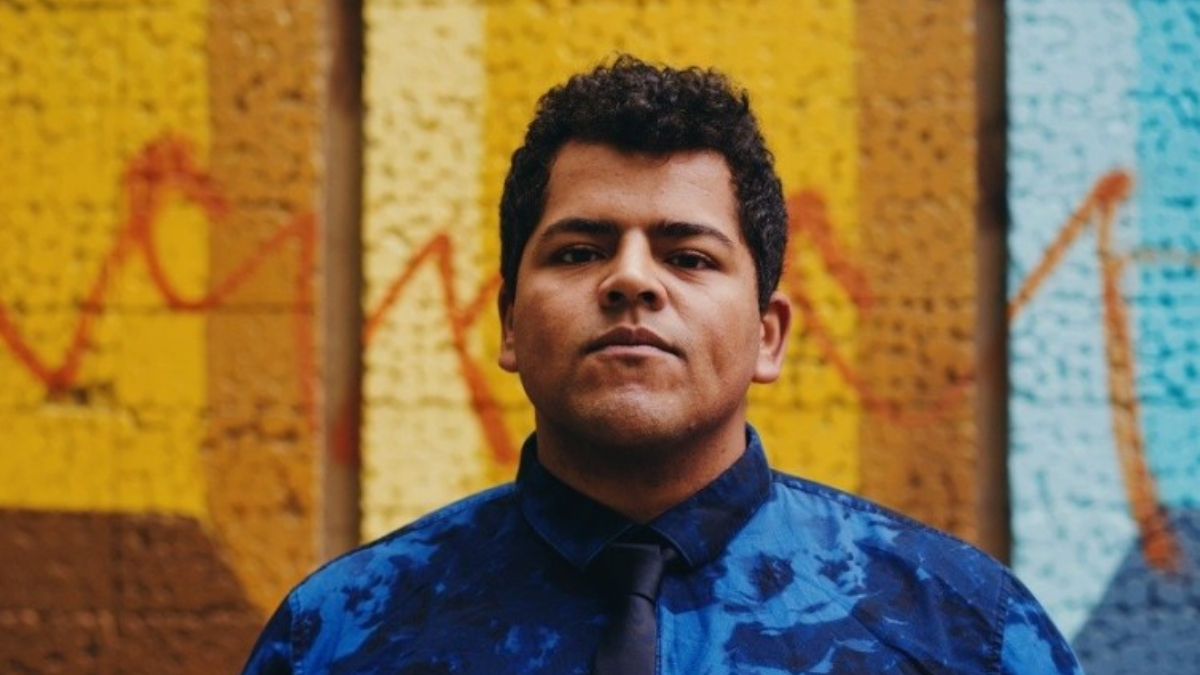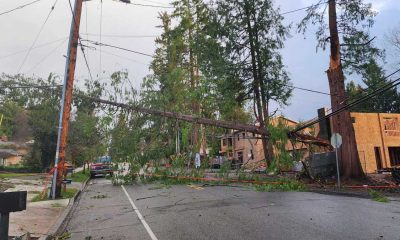Local
Seattle mayoral candidate Andrew Grant Houston discusses his platform and vision for the city
The 2021 mayoral candidate shares his vision and goals for Seattle.

[SEATTLE] – (MTN) Malcontent News is conducting a series of interviews with 2021 Seattle mayoral candidates. We have contacted, or are in the process of contacting the most viable candidates, inviting them to answer seven prepared questions. Our first interview was with Andrew Grant Houston.
For all candidates, the first interview will be about their platform and vision. Prior to the primary election, we will conduct a second round that will focus on differentiation, and challenging positions and visions. Once the final candidates are selected in the primary, we will invite them for one last round of interviews.
All candidates for the first round will be asked the same seven questions, and have received a copy in advance. These questions were created by our editorial board, and are aligned to topics of key interest to the residents of Seattle.
Malcontent News is committed to providing equal time for all candidates, and operating under a “fairness doctrine” of equal time and treatment for all candidates.
We will be publishing a transcript of each interview. Transcripts may be lightly edited to remove, umms, ahhs, pauses, and aid in readability.
ANDREW GRANT HOUSTON
Jennifer Smith:
Thank you so much for being here with us today and, you know, coming to share your vision with our viewers. We really appreciate that.
Andrew Grant Houston:
Yeah. I really appreciate being offered this platform and I really appreciate the work that y’all have done throughout the past year.
Jennifer Smith:
Thank you. Can you just tell us a little bit about yourself and what inspired to run inspired you to run for?
Andrew Grant Houston:
I am a queer Black and Hispanic architect originally from Texas and moved to Seattle at the end of 2016 to common design housing to get my license as an architect. And what I really realized is that over time, the progressive and more sustainable city that we always say that we are isn’t quite true once you kind of get into the weeds. And so after having a lot of frustration, trying to support and organize around land use reform climate issues after the last round of wildfires and seeing the city response, which did not feel appropriate, especially given that we have been in a housing emergency and a homelessness crisis since 2015, I finally said, okay, this has got to stop. We have got to stop talking about the city that we say that we are and actually become that city. And so that’s what I’m focused on.
Question one – houselessness crisis
Jennifer Smith:
Seattle is facing [an] ongoing housing crisis related to unhomed peoples Washington state experienced a 6.2% increase in homelessness during 2019 and 2020 King County spends over $1 billion per year in public and private investment in support of approximately 12,500 houseless people with disappointing results. If elected mayor of Seattle, how would you address this crisis? And how do you think your plan would provide aid in resolving the crisis both in [the] short and the long term?
Andrew Grant Houston:
Well, I really glad that you asked the question specifically looking at a short term solution and a long-term solution because that long-term solution is driving down the cost of housing, which is really tied to allowing for more housing to happen across the entire city and not just in Black and brown neighborhoods like we currently have with the urban village strategy, but in allowing for more duplexes, triplexes, fourplexes, and even larger, permanent supportive housing to happen in every single neighborhood in Seattle. And so that is how we really focus on that long-term solution. But I know firsthand as an architect, that even if we were to cut every single piece of red tape tomorrow, that it would still take about three years to build all of that housing. And so what that short-term solution really needs to be is tiny homes. If we allow for tiny homes, I know I’m proposing 2,500 tiny homes, that that is our short-term solution, how we truly address the crisis as the crisis that it is because we currently have 5,500 unsheltered people still in King County. That is really how we stem the bleeding.
But at the end of the day, something I really want to point out is just that we had some recent numbers come out from the last point in time count. So that’s where they go in one night and look over everything and see who is unsheltered and who is currently unhoused. It seems like the numbers in King County specifically are fairly stable. And so what that means to me is that as much as we are being successful in taking people out of being unhoused in a houselessness, that people are falling in at the same rate. And so we really need to focus on those preventative measures in order to ensure that less people fall into houselessness. And then that way we’re actually going to start to see some change.
Question two – infrastructure and economic recovery
Jennifer Smith:
It’s actually gotten worse as a result of the COVID pandemic. So as a result of the ongoing COVID pandemic, economic recovery, and development, as well as addressing Seattle’s crumbling transit infrastructure, such as the West Seattle bridge is of great importance. Moreover, some are expressing concern about the large corporations and many in the workforce, leaving Seattle. The question then is threefold. How do you plan on tackling the infrastructure issue, aiding economic recovery and development as we actually start to move beyond COVID? And what concerns do you have about the loss of corporations and workers in the city?
Andrew Grant Houston:
What I really have seen is not necessarily that we’re losing corporations. It’s more that people are recognizing that during the pandemic, they’re not able to enjoy the things that really make them want to live in a city in the first place. And so if you look at some of the numbers, especially in some of the movements happening in some of the other high-cost cities, like Los Angeles and New York and San Francisco, they’re actually people from those more expensive cities, particularly San Francisco that are moving here. And so we have actually seen a slight increase in our population during this time, even though it doesn’t quite make sense, like in our minds, like it does not quite compute, but it’s because they are having similar issues where they’re saying, look, San Francisco is just way too expensive. We need to go somewhere less expensive. And that’s here.
What we are seeing is that people from Seattle are actually moving to the suburbs in the area of moving to Kent and Renton and Auburn. And one of the reasons for that is because they’re looking to purchase homes. And so in that way, like I said before, we really need land-use reform so that we can allow for more people to purchase condos or townhomes or row houses. So in that way, they start to enter homeownership because that’s the thing that many people want to do. And as much as we know about the history of the United States, that that is how you build generational wealth for yourself and for your family. And so in that way, hopefully, we can bring people back to the city. Once we start to open up. My solution for a long-term strategy is really related to building more housing. And so in that way, investing more funds into not just housing, but also streets improving sidewalks and actually building sidewalks where we currently don’t have sidewalks. And all of those things that we have to do, all of those construction-related jobs are great living wage, union jobs. And so in that way, we are taking people from our communities and telling them, you can be a part of the positive change within your own community and build wealth that way as well.
Jennifer Smith:
One of the things too that happens is when people start to migrate to these places like Kent, and Auburn, and Renton is it drives up the rent. It drives up the price of housing and it exacerbates the homeless crisis. It makes it really difficult for people who were living in those areas because it was reasonable to continue to do so.
Andrew Grant Houston:
And in that way, that’s kind of why Seattle, as much as we are dealing with a regional homelessness crisis, that a lot of that crisis came from us because what ends up happening is that people move to those cities and they don’t have the same kind of protections that they have here as renters in Seattle. And so in that way, we do need a regional response, but a lot of the origin of our current crisis in the region is directly tied to the exclusionary policies that we have had here in Seattle for decades.
Question three – does Seattle have a crime and/or inequity problem
Jennifer Smith:
Police violence and ongoing racial…inequality. Seattle has earned a national reputation as a crime-ridden, dirty, and unsafe space. At one point, the city was labeled by the previous presidential administration as an anarchist jurisdiction. Do you agree with this view, what will you do to shift perceptions? And do you feel racial inequality exists within Seattle? And how do you plan to address it?
Andrew Grant Houston:
I would say that we’re not necessarily an anarchic jurisdiction as much as we are an anti-fascist jurisdiction. And I really say that with a lot of heart because I am a huge Seattle Sounders supporter. And I just remember whenever we were having a lot of the protests, especially within June and July of last year. And the president was complaining about Antifa and you would see Sounders supporters and the Emerald city supporters come out and say, no, yeah, we are Antifa – like three arrows down. Like we are going to be a part of this and support and really recognize that a lot of this police brutality is in essence state-sponsored violence. We need to provide methods of public safety that ensure people who look like myself are actually able to go out in public and feel safe themselves.
In that way, really thinking about how we redefine public safety, how we address our current methods of policing and say, this currently is not working. And I recognize that someone who is not just an architect, but an urban designer, that part of the safety is actually redesigning how our streets work and function. And so that is why I’m making not just policing, but also transforming our pedestrian infrastructure, transforming our bike infrastructure because there are a lot of deaths currently happening on our streets that are completely preventable. And then that way we’re really focusing on a true vision zero, that anyone can be outside in public space and feel safe at any time, day or night
Question four – police reform
Jennifer Smith:
When compared to the west coast cities of Portland, San Francisco, San Jose, Sacramento, Oakland, and San Diego, Seattle has the second-highest cost per police officer tied with Oakland and the second-highest officer per capita behind San Francisco. Additionally, the average officer makes $153,000 per year before benefits, according to the Seattle Times. Despite this large force and supporting budgets, Seattle police report slowed response times and claim the issue is a lack of staffing. The budget was cut [by] approximately 18% and staffing levels were adjusted to support roughly 1,325 officers. How would you define defund the police? And what is your position? How do you restore community trust in SPD?
Andrew Grant Houston:
Well, what you’re really talking about are two things you’re talking about reforming, and then also defunding. And so in essence, these two decisions that people are kind of going between when I say it’s more of a yes, and. I pride myself on wanting to become a mayor that is the “yes and” mayor that we both need to reform our current police department so that we can restore trust. But also during that process, we have to start redefining what public safety means. And that means 100% public safety, but less than 50% of that is the police. The number that really draws my attention that comes from the work that has been done for many, many years here in Seattle, since the start of the Consent Decree are from groups like Decriminalize Seattle, as well as the no new youth jail movement. So in that way, coupled with the King County Equity Now Coalition of which I am a member, as part of Share the City, looking at the nearly 70% increase since 2010, in terms of the budget.
I don’t know about you, but if I look at numbers and response times, I don’t feel like there has been a 70% increase in the effectiveness of the Seattle police department. And so in that way, we really need to focus on more of a model that looks at preventative care that looks at harm reduction that looks at really addressing the issues that a lot of people are facing before they enter into an event of a crisis. Because it’s not just about not responding to a crisis with a healthcare or someone or mental assistance, someone that is not a person with a gun. It’s also about addressing the instability that has created these crises. So in that way, that is why housing is such a big part of my platform is that if we reduce our number of unhoused individuals, we reduce the number of times that those people are facing the police or engaging with the police. If we reduce the number of people who are just getting by just struggling to survive, that commit crimes of poverty. Then again, we reduce the reliance on our current policing systems. And so in that way, it makes a clear message that we are working in ways that are.
Truly creating public safety has nothing to do with [the] police. And so it makes it that much more possible to be able to do the deep work, which has been asked for by [the] community for many, many years. But I’m really saying to people, especially as the only mayoral candidate who has committed to continue the work of defunding the police is I am listening to the community, especially those who are most impacted. People who look like me, fear for their lives every single day, they go outside that we are going to address this issue, head-on. We are not going to walk back any promise. I am committed to defunding the police and establishing a new method of public safety.
Question five – public mental health crisis
Jennifer Smith:
So one of the many things that COVID has shed light on is the ongoing mental health crisis in the country. Seattle’s not exempt from this. And recently a man in the throes of a mental health crisis was fatally wounded by SPD near the Seattle waterfront. Would you consider implementing something similar to the STAR program in Colorado, which replaces traditional law enforcement responders with a medic and mental health professional for some emergency calls as a way to deescalate situations where there is a clear mental health component?
Andrew Grant Houston:
Yes, 100%. And I feel like that model in particular is an excellent example of how we can provide public safety and maintain our public safety levels while also shifting resources from the police department into our new emergency center that has been established by the Seattle city council. And so just in that way, we are providing different types of public safety, different types of care that can address crises when they happen. Because at the end of the day, as someone who watched that video, someone was in crisis and was really, truly suicidal. But if you’re not addressing those issues head-on and directly engaging with that person, even though he did have a weapon, then we are never going to get to a point where we will truly address a lot of the trauma that we know is coming from COVID, like you were talking about specifically.
I know even for myself, there have been many days, especially as a high-risk individual, someone who just got my first dose of vaccine, so really excited, but I have spent as long as six weeks indoors without going outside, even once, clearly that is going to have a mental impact on myself that I don’t even fully recognize, but I know for myself and I have the privilege to have healthcare, to have mental health services so that I can go and get help. And so in many ways, when we talk about true public safety, we need to be investing in mental health services for those who can not afford it currently. And then that way we can avoid issues and incidents like the one that occurred on the waterfront.
Question six – Zoning and Seattle housing crunch
Jennifer Smith:
I know this is another thing that’s in your platform – land use. Eighty-eight percent of Seattle’s land that is zoned for housing is zoned for single-family. Over the last five years, most of the new construction has been centered in the 12% that supports high density, housing. Developers and builders focused on small footprint properties with minimal parking and luxury appointments. Housing affordability is a major problem for Seattle. Do you support changing zoning rules for ADUs (Additional Dwelling Unit) and more dense construction to alleviate the housing crisis? And what changes would you support?
Andrew Grant Houston:
This is something very near and dear to my heart as someone who is a lifelong renter. Since I was born and raised by my mother, a single parent, but also something that I have direct professional experience on. Before I moved here to Seattle, I was a land-use consultant. And so in that way, I was actually working with cities and aiding them in rewriting the rules that really define how their cities would develop. And so truly understanding the system that in many ways was established solely as a way to keep people of color out of neighborhoods in cities. Zoning in general has a very long history, but it does not have a history that has existed the entirety of the lifespan of even Seattle. Zoning that has become restricted and restrictive land-use codes in general in Seattle did not start until the twenties. And so what you see in a lot of neighborhoods that are currently zoned for only having one house per plot of land is that there are actually a lot of duplexes, triplexes, small apartment buildings that exist in these neighborhoods.
And so what we are saying is that this current system is not only a continuation of the white supremacy of the past, because that’s exactly what it is. We are saying that this is not sustainable environmentally, economically, or culturally. The thing that you really touched on is the urban village strategy, which focuses a lot of the density into areas, which are effectively either industrial land, downtown, or communities of color and the “gayborhood,” which I know firsthand because I live on Capitol Hill. I cannot tell you how many bars we’ve heard of during the pandemic have essentially shut their doors. Not because they could not afford to continue paying their rent, but because their landlord said, sorry, your lease is up and we actually want to redevelop a piece of property. When we allow for development to occur across the entire city, we are not going to see the displacement, and why I don’t call [it] gentrification. I call it “communacide.”
The cultural destruction of our Black and brown neighborhoods of Capitol Hill. That when we spread out that development across the entire city, not only will people then get to choose where they want to live, because I know a lot of people who want to live in Wallingford. And I know a lot of people who want to live in Laurelhurst and other places in the North End. There just is nowhere for them to be able to afford [it]. We will also be able to have a more sustainable city for everyone else that we will relieve the pressure that we currently have on our Black and brown communities, especially. So that they can also continue to enjoy their lives in the communities that they have developed there over time.
Question seven – Taxation
Jennifer Smith:
So moving on Seattle has a reputation for having high taxes compared to other Washington cities. A number of initiatives have added incremental taxes to fund transit, homeless programs, education, and the general fund. These taxes are small on paper, 1/10 of 1% per example, but most of these taxes are regressive due to Washington state’s tax structure. Will you pledge no new taxes on the citizens of Seattle?
Andrew Grant Houston:
No. Because we are going to shift to progressive taxes. We are going to establish an income tax and I am specifically establishing an income tax because legally we’re allowed to. A flat tax of 1% that I am calling the Just Transition Tax. In establishing this tax, I want it to fund specifically four things. One of them being apprenticeships. So we talked earlier about jobs and infrastructure and construction in order to build the housing that we need because we have a lot of housing to kind of backfill. We need to be able to train people to do that kind of work. And so I want to specifically dedicate some funds there.
You talked about earlier, how are we going to support small businesses coming out of the pandemic? The second thing that I want to do is reduce our business occupation tax, that they can be able to have that kind of recovery.
The third thing that I want to do is establish a new public development authority and what that is really going to be focused on is that research and development, the thing that private dollars really can’t do in order to focus on net-zero buildings. So in that way, all the new housing that we need does not additionally contribute to our carbon emissions because we know we just simply need to reduce those certificate money.
And the last thing that I want to do is invest more money into our equitable development initiative because that money is specifically going back to our Black and Brown communities, our BIPOC communities so that they can self determine the types of housing, the types of communities that they are able to develop for themselves.
Jennifer Smith:
So you referenced creating an income tax. Could you talk more specifically about what you mean by that?
Andrew Grant Houston:
So there was a recent decision, and I want to say it was [it was] summer of last year where the Washington Court of Appeals essentially said that Seattle itself actually has the right to tax income as property. Because that’s really what we’re getting at when it comes to the Washington State Constitution is that income is seen as property. And so in essence, this is being treated like a flat property tax. And so they have given us the legal go-ahead to tax up to 1%. Now I know that there definitely needs to be a way to make that flat tax more progressive. And so when I am in office, I definitely am focused on looking at how are we actually going to implement this? How are we going to get credits if people who are below a certain income. But, at the same token, what this really shows for myself and I believe is that when it comes to proposing policy, I’m not just spitting out words. I really am planning on doing the diligence and my team is already doing that due diligence in order to ensure on day one, I’m able to start an app and improve the city or all Seattlites.
Additional Questions
Jennifer Smith:
Thank you for clarifying that for me. I really appreciate it. Now. I kind of have a selfish question because I am a historian. My primary field is American Indian and indigenous history. Now I noticed on your website that you referenced that you advocate for indigenous sovereignty. You know, Seattle is home to the Duwamish peoples, who were federally recognized for a short period of time and then had that federal recognition revoked. But Seattle in itself has a very rich indigenous history and contemporary presence that is often overlooked and ignored, or sometimes, celebrated as a relic of the ancient past. So what do you mean when you say you advocate for indigenous sovereignty?
Andrew Grant Houston:
What that really means is recognizing the past and present of native indigenous people in Seattle and the larger Puget sound region. One of the things that I really love about Seattle is not just our land acknowledgment, but also that in our office of intergovernmental relations, that they specifically speak between the city and local tribes in the area. And so in that way, upping that engagement and really recognizing one, that should happen and continue to happen, especially as we address a lot of these regional problems and crises. Which for example, the homelessness crisis disproportionately falls on our native and indigenous people, as well as really recognized that one of our biggest responsibilities, especially as a holder of land, is to be good stewards of that land and do that in concert with our local indigenous people.
Jennifer Smith:
Thank you so much for answering that question. I saw it on your website when I was reading up earlier and I really want to ask this question.
Andrew Grant Houston:
Absolutely. And I think at the end of the day, for me, when it comes to especially any group of color, whether it be Black, indigenous, Asian-American that people are allowed the ability to self-determine and that when it comes to a lot of the solutions that I want to provide, that I want to provide them in a way that picks up those with the least first. And so that is why my campaign is even called The Rising Tide in the first place. A rising tide lifts all boats, but that it starts at the bottom and works its way up.
Jennifer Smith:
And I think that’s such an important thing because so much of settler colonization in the United States was justified through this brown people can’t self-govern. Brown, black people can’t self-govern. And so self-determination is such a huge thing for people to recognize. Is there anything else that you would like our viewers to know
Andrew Grant Houston:
Currently, I have a clear vision for the city should look like in 2100, but I recognize that myself as the potential incoming mayor will have a significant role to play in the next eight years, ideally in the next few terms, because ideally, the next mayor is actually going to start out two full terms and not decide to not run again. That policy and those policy points, and those plans will be coming out beginning next week. So we are going to be releasing our full slate of names and then get into more details and so I’m really excited to share that with people because a lot of the work from that came directly from the community when they looked at the vision and we asked them, we recognize that we share this vision together, that we all want to see the city improve in a number of these ways, but we have to also agree on the steps to get there. And so in doing that work already and having those conversations, we don’t have to repeat the Seattle process over again. We can say with certainty that I will be a mayor of action and on day one, start to implement the things that people are asking for.
Jennifer Smith:
Thank you so much for being here and speaking with us and sharing your vision. Look forward to seeing what you put out next week.
Andrew Grant Houston:
Absolutely.
David Obelcz contributed to this story.












